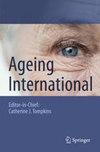Racial and Ethnic Disparities in Self-Reported Cognitive Difficulty among Older Adults: Evidence from New York City
Abstract
This study examined racial and ethnic disparities in self-reported cognitive difficulty among older adults in New York City and whether physical health, family structure, and individual and neighborhood socioeconomic status (SES) partially accounted for the association between race and ethnicity and self-reported cognitive difficulty. This study merged data from the American Community Survey 2019 and New York City Community District Profiles. Cognitive difficulty was measured by a dichotomous variable indicating whether a respondent self-reported having cognitive difficulty. Multilevel logistic regressions were used to examine the research questions. Results suggested that Latinos/Hispanics had the highest odds of reporting cognitive difficulty across groups. Physical health and individual SES were common attributes linked to disparities among Latinos/Hispanics and Blacks compared to Whites. Neighborhood SES contributed to the disparity for Latinos/Hispanics, whereas family structure was a unique attribute for Blacks. No significant factor was identified for disparities between Asians and Whites. Our findings shed light on intervention directions to reduce racial and ethnic disparities in cognitive difficulty.

 求助内容:
求助内容: 应助结果提醒方式:
应助结果提醒方式:


